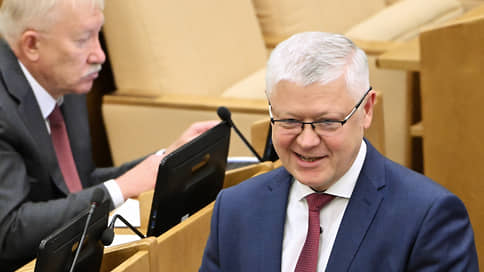Deputies tightened access to state secrets for themselves and other Russians
[ad_1]

The State Duma on Tuesday adopted in the second reading a bill on strengthening measures to protect state secrets. By the second reading, the document, which initially prohibited access to classified information for holders of foreign assets, was supplemented with similar restrictions for Russians whose close relatives have a documented right to permanent residence abroad. In addition, the draft introduced a rule according to which parliamentarians admitted to state secrets may be prohibited from traveling abroad by decision of the heads of the relevant legislative bodies. The opposition’s amendments, designed, according to their authors, to guarantee access to state secrets to all deputies of the lower house, were not supported by the Duma majority.
As previously reported by Kommersant, amendments to the law on state secrets were introduced to the Duma in March by members of the security committee headed by its chairman Vasily Piskarev (United Russia, EP). Among other things, they proposed to include in the list of grounds for refusing access to classified information an item on whether the requesting person or his relatives have foreign assets. “Recently, security agencies have recorded an almost two-fold increase in actions of a different nature (recruitment with elements of blackmail, provocation, etc.) committed by foreign intelligence services against secret carriers during their stay abroad or using the Internet after their return from foreign trips” , — Mr. Piskarev motivated the initiative in his Telegram channel.
In addition, the deputies advocated expanding the very concept of state secrets, including, among other things, “information, the dissemination of which may damage the security” of the country – the current law refers only to similar information in the field of “military, foreign policy, economic, intelligence, counterintelligence and operational-investigative activities. And the related travel ban is proposed to be extended to everyone who somehow had access to information of particular importance or top secret information (now the travel ban is regulated by the relevant labor contract).
By the second reading, the list of grounds for refusing access to state secrets was supplemented with a clause on the possession of a potential secret carrier or his immediate family members of citizenship, a residence permit or other documents confirming their right to permanent residence abroad. And an amendment was proposed to the law “On the procedure for leaving the Russian Federation and entering the Russian Federation”, according to which the decision “on limiting the right to leave the Russian Federation of senators, deputies of the State Duma and regional parliaments who are aware of information of particular importance or top secret information” has the right to take the chairmen of the relevant legislative bodies, and in relation to the heads of municipalities – governors.
The last innovation provoked criticism from the Duma opposition. “Dear colleagues, to be honest, I am surprised by this amendment,” admitted deputy Valery Gartung (“A Just Russia – For Truth”). “The fact is that all of us, deputies and senators, have equal status, we are elected citizens. And, with all due respect to the chairman, to restrict our movement?..” Mr. Hartung called the procedure proposed by the authors of the project “unacceptable”, suggested that “some other” mechanism could be prescribed in the law, and submitted this amendment to a separate vote. Anatoly Vyborny (ER), Deputy Chairman of the Security Committee, who presented the draft in the second reading, however, assured that this amendment is fully consistent with the logic of the development of legislation and the policy of the authorities in the field of state secrets. “As you know, we have permission, but we have access to state secrets,” United Russia explained. “And among our deputies, those who have access to state secrets are no more than 8%.” The creation of another mechanism, Mr. Vyborny considers it inexpedient.
Deputy Aleksey Kurinny (KPRF) was excited that instead of the current norm “State Duma deputies … are allowed to access information constituting a state secret,” the authors of the draft proposed the wording “admission to state secrets is issued in a special manner … to State Duma deputies.” “The bill sharply limits the number of those who will be admitted to state secrets: special lists, special groups,” Mr. Kurinny explained his fears. “The rest of the deputies will not have access to secrets in the same order. This will complicate the work – visits to enterprises as well. The communist suggested that when obtaining access to state secrets, “much more questions” would arise for deputies from the opposition, who “will be told that you do not have a special permit obtained in a special manner in the State Duma, so we will not take you to one place let them in, we won’t let them in another, we forbid them to get acquainted with some documents that will have a special order. Therefore, Alexei Kurinny made his own amendment, in which he proposed to maintain the previous procedure for accessing state secrets. But his arguments were not supported by either the committee or the Duma majority.
As a result, the State Duma approved the bill in the second reading by a confident majority – 341 votes in favor and four against. In the final third reading, the document is planned to be adopted on Wednesday.
[ad_2]
Source link








